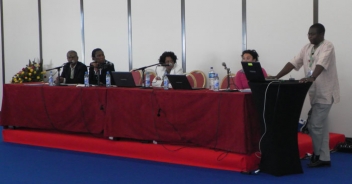This blog was written by Denebo Dekeba, Programme Officer at HelpAge affiliate, Ethiopian Elders and Pensioners National Association.
 This month, Ethiopia hosted the International Conference on AIDS and Sexually Transmitted Infections (STIs) in Africa (ICASA) for the first time.
This month, Ethiopia hosted the International Conference on AIDS and Sexually Transmitted Infections (STIs) in Africa (ICASA) for the first time.
Exchanging knowledge and experiences
ICASA was founded by a group of African scientists to provide a forum to exchange scientific knowledge, experiences and best practice on all topics relating to HIV and AIDS, and STIs.
Addis Ababa was busy with guests from around the world, including government and NGO representatives, scientists, health professionals, policy makers and community leaders.
The conference sessions and events were enriched by Ethiopian hospitality and the sunny weather. I had the privilege of attending this event for the entire five days on behalf of the Ethiopian Elders and Pensioners National Association (EEPNA).
Generating support for the HIV response
During the conference, hundreds of sessions were held on topics dealing with the prevention of HIV, access to HIV services, social and behavioural changes, the role of leadership in delivering results, policy and health economics.
A series of plenary sessions, workshops and community development programmes also happened to generate support for the HIV response, to discuss common values and to share best practice.
The sessions and workshops were facilitated in both English and French, with simultaneous translations and a group of rapporteurs were assigned to each session.
HIV interventions exclude older people
In some of the sessions, particularly those dealing with access to HIV services for highly vulnerable populations, some research papers were presented.
The topics included the use of Voluntary Counselling and Texting (VCT) by older people in Africa and HIV sensitive social protection. These sessions revealed that interventions carried out to address HIV and AIDS have marginalised older people.
The last session was devoted to summarising the other sessions, with rapporteurs making recommendations and action points. They highlighted critical points including achievements and gaps in HIV prevention interventions and research, as well as many other areas.
Older people’s issues overlooked
During these sessions, strategies for risk reduction and further considerations of vulnerable groups were also looked at. The focus was on youth, female commercial sex workers, lesbian, gay, bisexual and transgender people and people living with HIV and AIDS.
The rapporteurs significantly overlooked the issues of older people discussed during the sessions. Little was mentioned about them both under strategies for risk reduction and in the section dealing with further considerations for vulnerable groups.
The conference linked political and national leaders, the scientific community, practitioners, communities, civil societies, the private sector and partners to scale-up and sustain the response to HIV and AIDS.
However, I was astonished at how the rapporteurs overlooked the issue of older people when summarising ICASA 2011.
What next?
- Download the statement from the “HIV and Ageing” conference.
- Read more about our work to ensure older people are included in the response to HIV and AIDS.
